Inflation makes everything more expensive, including for students, of course. For a room in a shared apartment they have to expect an average rent of 479 euros per month, in Munich even 760 euros; just a year ago it was 720 euros. This is how it ends an analysis by the Moses Mendelssohn Institute from this year. What the study also shows: In 73 German university cities, the average rent for shared rooms is higher than the Bafög housing allowance – it is 360 euros. This means that for many who rely on state student aid, finding accommodation is becoming a real challenge. You have to save elsewhere or look for a part-time job, some of which can also be credited towards your student loan.
In its coalition agreement, the traffic light government promised a “fundamentally reformed Bafög”. The bill passed by the cabinet does provide for a few changes: For example, in the future, students will be able to study longer without giving reasons thanks to a “flexibility semester” without losing their entitlement to BAföG. In addition, the allowances for the income of students and their parents are to increase. And: Students from households that receive social benefits should receive a one-off start-up aid of 1,000 euros.
However, the government does not want to increase the regular payments, the rates for basic needs and the flat rate for housing costs – even though not only the rents, but also the electricity and even the kebab have become more expensive. The maximum Bafög rate last rose in autumn 2022, and since then it has been 934 instead of 861 euros per month (including housing costs). Many people therefore consider the government’s reform plans to be inadequate, including the federal states. In a statement last Friday, the Federal Council called for improvements to be made to the reform.
Many can neither afford an internship nor a semester abroad
“Existential fears fill your head,” says Wolf Dermann from the Arbeiterkind.de network, which advises students with a non-academic background. He talks about students who don’t even think about internships or stays abroad because they can’t afford them, who tell their friends that they don’t have time for the cinema or the club – even if they actually don’t have the time but the money . In 2021, when many people lost their part-time jobs due to the corona pandemic, According to figures from the Federal Statistical Office, more than a third of students were at risk of poverty. That means they had less than 1,251 euros per month. Students who come from working-class families are more likely to complain about financial insecurity than students whose parents are academics.
The start-up aid of 1,000 euros could definitely be a “blessing” for young people, says Wolf Dermann, for example to buy a new laptop at the start of their studies, to pay the enrollment costs or the deposit for a shared room. But in order to really bring more equal opportunities to universities, a fundamental reform is needed, one in which the requirement rates are calculated transparently on the basis of shopping baskets, in which the money arrives on time and not with a delay of months, as happens all too often the case is.
The Federal Council’s statement is now up to the government, which can decide how to respond. The Bundestag must pass the reform by the summer break in July so that the changes can come into force in the 2024/25 winter semester.

